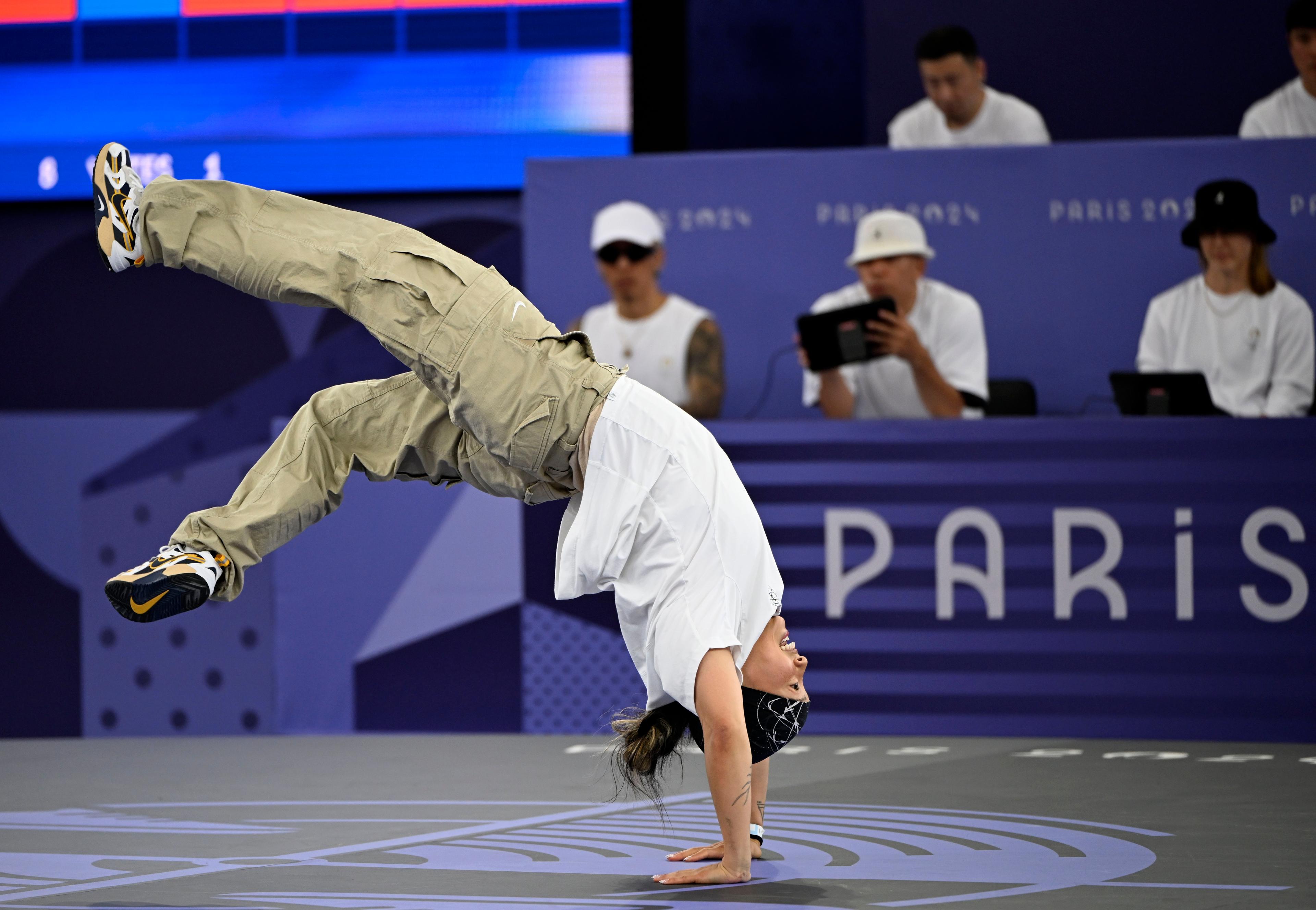Breaking, Olympics
Why Raygun's Olympic breaking performance opened the door to huge online hate
Raygun's unexpected Olympic performance shook up the breaking community and sparked a global firestorm: As memes and debates spread, Australia's hip-hop scene had conflicting feelings on her performance anbd what that means for breaking going forwards..

In a small Sydney warehouse, the tension was palpable: Breakers prepped with ab exercises that would put a Pilates class to shame, all while psyching themselves up for the qualifier of a lifetime — the Red Bull BC One World Finals. But looming over the event was something heavier than the usual pre-competition jitters: the viral fallout of Rachael Gunn, aka Raygun, at the Paris Olympics.
Raygun's Olympic journey wasn’t just any story; it sparked a storm. On the other side of the globe, the Australian hip-hop scene felt the tremors.
Gunn, a 36-year-old university lecturer, was the first Australian B-girl to make it to the Olympics, but her unorthodox performance — complete with moves like the sprinkler and kangaroo-inspired hops — turned her into an instant meme and a target of global criticism.
“I feel like it's just pushed our scene in Australia into the Dark Ages,” said Australian hip-hop pioneer Spice. For some, Raygun’s performance was a hard pill to swallow. They felt it reflected poorly on the Australian breaking scene, and her viral loss added insult to injury. “It made a mockery of the Australian scene, and I think that's why a lot of us are hurting,” Spice added.
But while some were quick to critique, others rallied around Gunn. They argued that the online bullying and memes had overshadowed any fair analysis of her performance. “The global trolling has been brutal,” one competitor said, shaking his head at the memory of the internet’s reaction.
From Jazz to Breaking: Raygun's Journey
Rachael Gunn’s path to breaking wasn’t exactly a straight line. She began in jazz, tap, and ballroom dancing before her husband and coach, Samuel Free, introduced her to breaking at 20. “There were times I’d go into the bathroom crying because I was so embarrassed at how terrible I was,” she recalled in an interview with The Guardian Australia ahead of the Olympics.
But she didn’t quit. Over time, Gunn not only became Australia’s top-ranked B-girl but also earned a PhD in the cultural politics of breaking. When she won her ticket to Paris at a Sydney qualifier last October, it seemed like a storybook ending. Little did she know that her Olympic debut would be anything but a fairy tale.
The Global Spotlight on Breaking at the Olympics
Breaking’s Olympic debut was already under scrutiny. Could a sport born in the streets of the Bronx really thrive on the world’s biggest stage? Some thought the Olympics would dilute the essence of breaking, while others hoped it would shine a global spotlight on the art form.
In the end, all eyes were on Paris — but for the wrong reasons. Raygun’s Olympic routine spread like wildfire, leading to a torrent of online abuse. Over 50,000 people signed a petition demanding she apologize, accusing her of manipulating her way into the competition at the expense of more talented Australian breakers. Conspiracy theories swirled, with some claiming she had created the governing body that organized the Oceania qualifiers. Even her husband, a prominent breaker and qualified judge, was falsely accused of being part of the panel that selected her.
Australian fact-checkers and the national breaking organization, AUSBreaking, were quick to debunk these claims. Judges were impartial, and not a single one on the nine-person panel was Australian. But once the floodgates of online hate had opened, it was hard to close them.
Gunn, devastated by the backlash, took to Instagram to share her side. “I worked my butt off preparing for the Olympics and gave my all,” she said in a heartfelt video. “I never expected the hate that followed. I just wanted to bring some joy.”
A Divided Community
The Australian hip-hop community was left grappling with the aftermath. Some admitted that Raygun’s performance initially elicited a chuckle, but they were quick to condemn the wave of abuse that followed. “On any other stage, she’d be applauded for trying something different. But this is the Olympics — you need to be at a certain level,” Spice said. Yet even Spice, critical as she was, drew the line at bullying. “It’s disgusting,” she added.
But for many B-girls, Raygun’s performance didn’t represent the standard of breaking in Australia. “I was embarrassed,” one dancer admitted. Beyond the memes, the incident had a real impact on the Australian breaking community, especially on the younger dancers. They faced harassment online and in person, with some even feeling unsafe practicing in public.
Yet despite the pain, some saw a glimmer of hope in the chaos. Te Hiiritanga Wepiha, a judge on the Oceania qualifying panel, argued that Raygun’s performance could bring much-needed attention to the breaking scene in Australia. “At the end of the day, she’s the most famous Olympian of 2024,” he said. “She might actually save the scene here.”
Raygun’s Olympic journey may have divided the breaking community, but it also highlighted the passion, talent, and resilience of breakers in Australia. Whether the global spotlight helps or hinders the scene remains to be seen, but Raygun has definitely left her mark on breaking — for better or worse.
* BBC Sports contributed to this article.